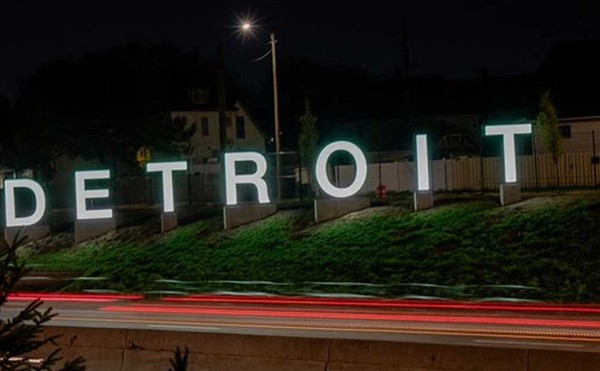While you’re reading this, I’m probably either A) sleeping off a long night out; or B) in the thick of one on the streets of Austin, Texas, where I’ll be chasing down as many of the 22 bands from the Detroit scene playing this year’s South By Southwest Festival as I can. Yup. 22. That means there’ll be no fewer than 100 Detroiters roaming the streets of Austin during this annual industry buzz-and-blow fest. That means at least a couple outfits will emerge with said buzz atop their hip melons as they take the gospel of Detroit rock ’n’ roll to the people of this great land.
Going into this summer, it looks like Detroit’s nowhere near losing the spot on the cultural map earned most recently by the Ems, the Kems, the Slums, the Whites and the Rocks of the music whirled. Better still, there are hotly anticipated (or some other such hype-worthy phrase) new albums from the White Stripes, Adult., the Von Bondies, Bogue, the Detroit Cobras, the Electric Six, the Dirtbombs, Slumber Party and Pas/Cal. Add the sure to be hype-worthy re-emergence of the Derrick May-helmed Hart Plaza electronic music festival (whatever the hell it ends up being called), and it looks like Detroit’s far-flung music community is doing its part to heed Kwame’s call for spreading the civic pride.
Sure, there are but a few non-Clear Channel-bullied small venues with decent sound and adventurous booking policies, but we’re getting there.
One small victory on the home front, certainly, is the opening of Pure D. Vinyl. It’s a boutique-sized loft record shop within the Pure Detroit store (in the Fisher Building on Grand Boulevard) featuring a smorgasbord of great 12-inch and 7-inch wax by Detroit artists — from Carl Craig to the Gore Gore Girls, Andre Williams to the Witches, Mad Mike to Mick Collins.
While the Pure Vinyl store has been open for a while now (it even hosted an event featuring DJ Shake and Carl Craig’s Planet E records during last year’s TasteFest) it celebrates its grand opening this weekend with a truly “Detroit” party. The shindig will feature live sets representing many of the facets of Detroit’s musical jewels. The store is the result of an odd bit of networking that found Pure Detroit owner Shawn Santos connecting with Carleton Gholz, a Detroit zine publisher (se-mi.org), DJ (Paris ’68), and educator. The idea was simple: Create a store that showcases the same kind of Detroit spirit as the Pure store, but focusing on music.
Gholz is, in fact, just the right man for the gig. He’s that rare combination of a scenester who isn’t afraid to admit that he’s not hip to something yet. He’ll take a musical argument (er, rather, discussion) just as far (and, usually, just a sketch farther) as his immediate knowledge allows before stepping back to ask the questions that will allow him to move further in his understanding. And the kid’s got an academic’s sense of order too. So it’s no surprise that when I first visited Pure D. Vinyl, he was obsessing over exactly where to place the Hideout compilations in relation to the MC5 reissues on the rock wall while carrying on a conversation with Three Floors of Fun marquee turntablist, DJ-producer Houseshoes about expanding Pure’s hip-hop selection.
Last year, Gholz started making phone calls, visiting musicians and record shopping to fill the shelves. And the response was overwhelmingly positive. To hear him tell it, it’s a dream gig, visiting with Detroit’s music luminaries and looking for vinyl rarities and extra copies of records to help stock the store’s shelves.
“I’ll buy an old 7-inch that just never sold. At least it will find air time in my store,” says Gholz. “And people appreciate that we’re only buying one or two copies and that we’re not doing consignment.”
“It’s an unlikely spot for a record store,” says Gholz, “because [of the location near the Fisher Theatre and its crowd] you get people coming in who have never heard of something that you might think is huge. And you also get folks who will buy the same record, like the Hideout Records compilation, purely for nostalgia that someone else might buy for its connection to the current scene.”
On the other hand, part of Gholz’s vision for the store is a place where hardcore techno fans can count on getting their 313 itch scratched.
Why just vinyl? “When you get into selling CDs, you can lose focus so fast,” says Gholz. “And the space is limited. Vinyl forces a kind of appreciation that’s gone with CDs.”
“The one thing I hear most from people who visit is ‘They still make vinyl!’”
You gotta love a store that brings the Cats crowd together with the hepcats. And I know that was a terrible pun, but you know, it’s the truth.
The grand opening of Pure D. Vinyl will be Thursday, March 13, at the Fisher Building (3011 W. Grand Boulevard, Suite 101, Detroit). Party starts at 7:30 p.m. with performances by Gore Gore Girls, the Elevations, Minx, Franki Juncaj, Gerald McBride and Adam Lee Miller. For information, call 313-873-7873.
Red roses for thee
I’ve been listening to the Pogues’ Rum, Sodomy and the Lash over and over and over again these past few days wondering why, exactly, they don’t make records like this anymore. Records that are as lyrical as they are punk, as punch-drunk as they are poetic, but mostly, as accomplished as they are freewheeling. Of course, for the most part, the middle ground of punk has been eaten away, leaving only the young, dumb and fulla cum at one end and emotionless, reactionary noise at the other.
Yeah, I know I’m generalizing, and I’m not trying to get all nostalgic or anything, but, see, I just sat through a screening of If I Should Fall From Grace: The Shane MacGowan Story — a documentary by Irish filmmaker Sarah Share.
And I’ll be damned if there wasn’t some good, old-fashioned anarchy left in the ol’ rock ’n’ roll gal as recently as 1990. (I’m still not totally convinced that the alt-rock revolution featured much actual anarchy, so don’t give me Nirvanagrrlelectro musical revolution conspiracy theories, k?)
But back to the flick, cuz if you’re A) a fan of the Pogues; B) a fan of music, its attendant culture and dramas and punk’s ripple effects in particular; or C) just someone who likes rubbernecking at the depths to which a human will torture themselves to make a fuckin’ point, you should make a date to sit down with this flick March 17, 2003, on the Sundance Channel.
The film is an unblinking chronicle of the rise and fall of MacGowan, the notorious front man, songwriter and poetic soul of the late lamented Pogues (and later, his own troupe, the Popes). In his prime, MacGowan was a good as they came, spitting vitriol and verse through his ill-kept grill of teeth, fueled on booze and drugs in a quite public display of self-destruction as art. Bukowski was a lightweight in the consumption department compared to MacGowan. And, frankly, MacGowan touched the sublime more often than he epitomized the ridiculous.
Better still, the Pogues were the ultimate party band — bashing traditional Celtic folk and punk rock together till they stuck. They were a rolling gang of players that gave Irish expats in England a reason to fly the orange, green and white in a time when “No dogs, no blacks, no Irish” signs were still an everyday reality. (Unfortunately, they also gave a good number of American frat-drunks the romantic notion that to be Irish is to be soused and obnoxious.)
Frankly, there’s not a whole helluva lot of good info out there about this contrary, oft-brilliant gutter-poet bastard, and for If I Should Fall, MacGowan allowed Share unprecedented access to his private life. In interviews with MacGowan and his parents, we learn of his troubled early years, treatment for mental illness, drug use and his introduction to punk. “I loved the Sex Pistols if for no other reason than Johnny Rotten was so blatantly Irish,” hisses MacGowan in one of the recent interviews which find him, invariably with drink and smoke in hand and chortling at his own wretched state of affairs with a laugh that’s half asthma, half Ernie from “Sesame Street.”
Through interviews with MacGowan, his longtime squeeze Victoria Clarke, former Pogues bandmate Philip Chevron and others, we’re treated to a tour through the world of a man who has become a ghost by his own making, a legendary banshee turned will o’ the wisp.
If you must romanticize MacGowan (and the film offers lots of reasons not to do so), his life is performance taken to an existential level. He is Beckett meets ugly stereotype. But it’s MacGowan’s white-bearded father, who sits in the comfort of the hearth defending his child and choking back emotion, who puts it best: ‘He was a brilliant man ... still is, a few billion brain cells later.”
Chris Handyside writes about music for Metro Times. E-mail [email protected]




